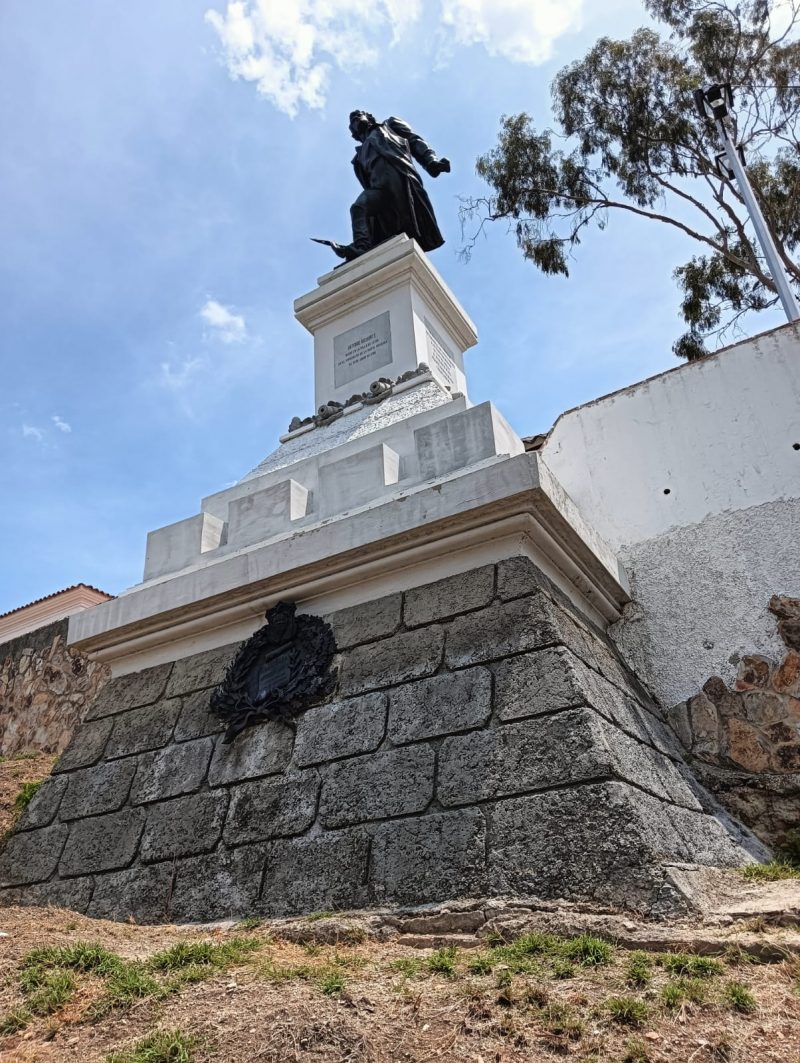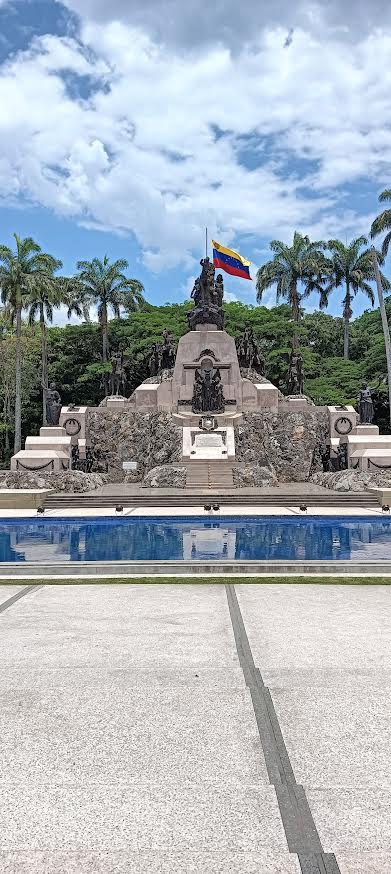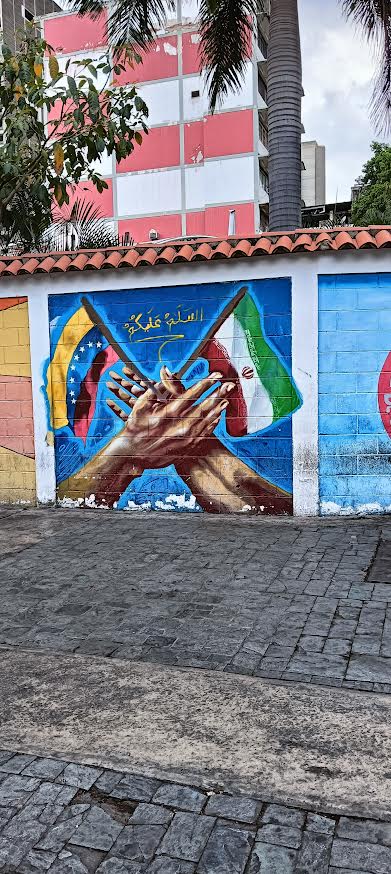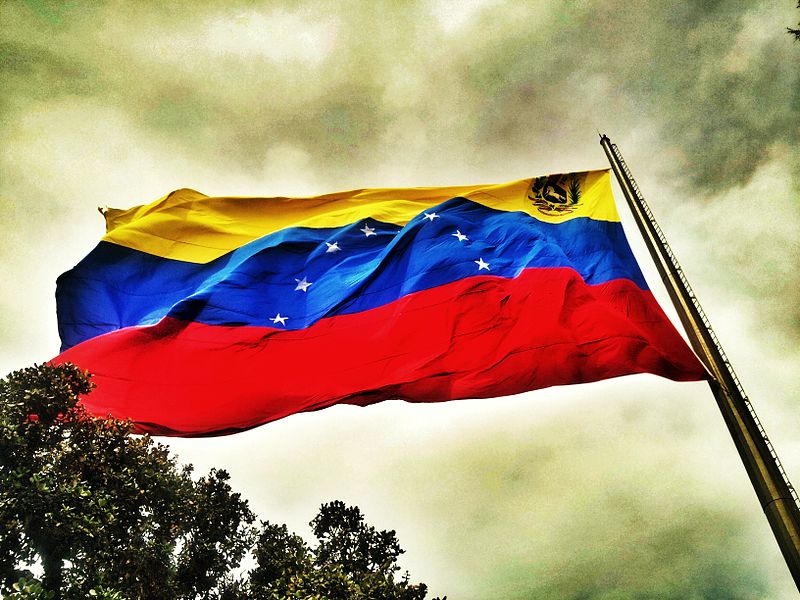In the heart of Latin America, there is an enchanting country nestled between the mountains and the Caribbean coastline, the Bolivarian Republic of Venezuela – a nation that has found itself at the center of a complex economic and political situation. During a month-long trip to this fascinating country, I had the opportunity to discover the true soul of the Venezuelan people, who, despite the challenges and damage caused by the sanctions imposed by the empire and Washington’s western lackeys, resist every day with incredible tenacity. The same tenacity is shown by President Maduro, who first had to take up the challenge of continuing the work of a giant like Hugo Chavez. And then, he became a symbol of resistance to the arrogance of US imperialism that tried, failing, to overthrow him in every way. The US imperialism even organized coups and tried to eliminate him physically, but it was defeated.
In his novel ‘Los Amos del Valle’, Venezuelan psychologist and writer Francisco Herrera Luque writes that in Caracas “the sky is so blue that it is scary to look at it”. The first impression is exactly what Herrera Luque describes: The sky is an almost blinding blue. Which does not displease a Neapolitan who has travelled to Venezuela to get to know this extraordinary country at a time when his own football team (whose uniform is blue) is preparing to win the championship for the first time since the greatest footballer in history, Diego Armando Maradona, no longer wears the Neapolitan jersey.
Leaving aside the footballing parenthesis, we can say that the impact on Venezuela is impressive. Venezuela is a country under siege. The sanctions imposed by the United States are producing the same damage as a war, as the Brazilian President Lula has denounced. Yet, the country is alive, resisting and advancing towards recovery thanks also to the support of multipolar powers such as Russia, China, Iran and Türkiye.
The consequences of sanctions
The economic sanctions imposed on Venezuela have had a profound impact on the daily lives of its people. The trade and financial restrictions have led to a severe economic crisis, problems in the health system and in recent years a shortage of basic necessities, which is now being overcome. Venezuelans face the daily challenge of surviving in an economy affected by sanctions, but their determination is unstoppable.
The resistance of the Venezuelan people
I was able to observe the extraordinary resistance of the Venezuelan people, despite the difficulties. In the midst of problems, communities have come together to find creative solutions and support each other. I met people who started their own urban gardens, while others opened small artisanal businesses to generate income. Every day, Venezuelans strive to overcome adversity, demonstrating unparalleled determination.
An unstoppable energy
Despite economic difficulties, the Venezuelan culture shines with an infectious vitality and passion. I had the opportunity to witness dance performances, traditional music concerts and street art festivals that demonstrate pride and love for their cultural identity. Venezuelan artists, with their creativity, manage to bring hope and joy into people’s lives, demonstrating that culture is a powerful weapon against imperialist abuse.
There is an iconic place in Venezuela that I was lucky enough to be able to visit that embodies the love for its Bolivarian, anti-colonialist and anti-imperialist identity. A place that connects El Libertador Bolivar directly with Hugo Chavez and Nicolas Maduro: San Mateo.

In San Mateo, the house where Bolivar lived has been turned into a museum (Casa Ingenio Bolivar). In this symbolic place one breathes the anti-colonialist ideals of the Libertador and the anti-imperialist and revolutionary spirit of Hugo Chavez, who was Bolivar’s follower. Bolivar liberated much of Latin America from Spanish domination, while Chavez by his action drove the United States out of Venezuela, right up to Maduro who, with his heroic resistance to the overweening empire, courageously carries forward the Bolivarian flag. Significantly, in my opinion, there were recruits from the FANB, the Venezuelan armed forces, forged by Chavez on the very ideals of Simon Bolivar. A people’s army: anti-imperialist and anti-colonialist. San Mateo is a symbolic place in the history of this extraordinary country, yesterday occupied by Spanish troops, today besieged by the North American Empire.
Another site that perfectly symbolizes Venezuela’s anti-colonialist and anti-imperialist roots is Campo Carabobo. The place where on 24 June 1821, in the locality called Sabana de Carabobo, near the city of Valencia, the battle was fought that established the independence of Venezuela, commanded by General Simón Bolívar, known today as the Battle of Carabobo, giving this place the historical and symbolic value it represents.

We find the same values today in the beautiful capital city of Caracas. Along with the symbols of the new multipolar world that help Venezuela resist the neo-colonialist siege of the United States, which aims to oust the Bolivarian Revolution in order to seize the country’s huge oil reserves, as former President Donald Trump has publicly admitted.
My trip to Venezuela taught me that even in the face of the most difficult challenges, the Venezuelan people keep hope and determination alive. Despite the damage caused by international sanctions, the resistance of the Bolivarian people and government is a testament to a strength that cannot be broken.
Every day, Venezuelans show the world that humanity has an extraordinary capacity for resistance and that love for one’s land, values and culture can overcome any obstacle. Venezuela deserves to be recognized not only for its difficulties, but also for the extraordinary strength of its people and the extraordinary courage of its president, who has managed to preserve and defend the extraordinary achievements of the Bolivarian Revolution.
BRICS and de-dollarization: Venezuela’s way to overcome the effects of criminal sanctions
As we have already pointed out, Venezuela has been in the center of a complex economic situation for years, due to the criminal international sanctions imposed on the country. However, the Venezuelan government is actively seeking new strategies to deal with the effects of these restrictive measures and has turned its attention to the BRICS (Brazil, Russia, India, China and South Africa), a coalition of emerging nations that could offer a new horizon of opportunities.
In this regard, like Iran and Saudi Arabia, Venezuela has applied to join the BRICS family. Recently, after a meeting in Brasilia with President Luiz Inacio Lula da Silva, President Nicolas Maduro said that Venezuela feels ready to contribute to the ‘construction of the new world geopolitical architecture that is emerging’. Maduro then explained via Twitter: ‘Venezuela is at the forefront of the emergence of a multipolar world moving towards the development and construction of the new geopolitics of cooperation, solidarity and peace. This can be achieved if we move forward together’. Furthermore, Venezuela is pursuing a policy of de-dollarization, seeking to free itself from dependence on the US dollar. This is a decisive move for Venezuela, which is trying to overcome the effects of sanctions by joining the BRICS and de-dollarizing its economy.
The BRICS represent a challenge to Western economic hegemony and offer Venezuela new possibilities for collaboration. This economic coalition is characterized by greater autonomy from the international financial institutions controlled by Western powers. Venezuela has sought to consolidate its relations with BRICS members by developing strategic partnerships in the energy, agriculture and infrastructure sectors. Through increased cooperation with these emerging nations, Venezuela seeks to diversify its sources of economic support, reducing dependence on sanctioning nations, which have seized Caracas’ foreign assets, even Venezuela’s gold in the case of the UK.
Reducing the use of the Dollar
Venezuela has undertaken major efforts to de-dollarize its economy, seeking to reduce dependence on the US dollar as a reference currency. This policy aims to protect the country from international currency market fluctuations and the risks associated with the use of a currency controlled by a sanctioning country. Foreign countries, causing major problems in everyday life for Venezuelan citizens who have to deal with continuous price fluctuations and wages that undergo severe devaluation, also artfully manipulate the value of this currency. Therefore, the Venezuelan government is promoting the recovery and use of its Bolivar, encouraging commercial transactions in alternative currencies such as the euro, Russian ruble and Chinese Yuan. This transition requires significant effort, but could provide greater economic stability for the country.
Strategic investment and cooperation
The BRICS also offer Venezuela opportunities for strategic investment and cooperation. China, for example, has supported Venezuela through significant investments in the energy sector, contributing to the modernization of infrastructure and the development of joint projects. Russia, on the other hand, has offered assistance in the modernization of its armed forces and collaborated in the creation of shared space programs. These partnerships help diversify the Venezuelan economy and reduce the impact of international sanctions.
As in the case of those countries not aligned to Washington’s diktats, such as Türkiye, which supply goods to the country despite the sanctions, as I witnessed first-hand in several supermarkets well stocked with Turkish products. In the health field, this cooperation has been crucial in overcoming a particularly odious and criminal aspect of the sanctions: the ban on the export of medicines. Venezuela managed to overcome the lack of Western-made drugs by supplying ‘equivalent’ drugs not produced by multinational drug companies, but rather by countries such as India and Iran or domestically produced drugs. These drugs are available at reduced prices from the so-called mobile pharmacies that the Bolivarian government has placed in every city. I myself had a small problem that was easily solved with a Venezuelan-made ointment.

Conclusions
Venezuela is trying to overcome the effects of international sanctions by joining the BRICS and de-dollarizing its economy. Collaboration with these emerging nations offers the country opportunities for economic development, strategic investment and technological cooperation. By reducing dependence on the US dollar and seeking new markets, Venezuela is trying to build a stronger and more resilient economic base.
However, it is important to emphasize that international sanctions continue to have a significant impact on the Venezuelan people, harming their quality of life and limiting access to essential goods and services. Therefore, it is critical that the international community carefully examines the impact of sanctions and demands an immediate end to imperialist interference that aims at undermining Caracas’ sovereignty, in order to promote the stability and well-being of the Venezuelan people.

















Leave a Reply